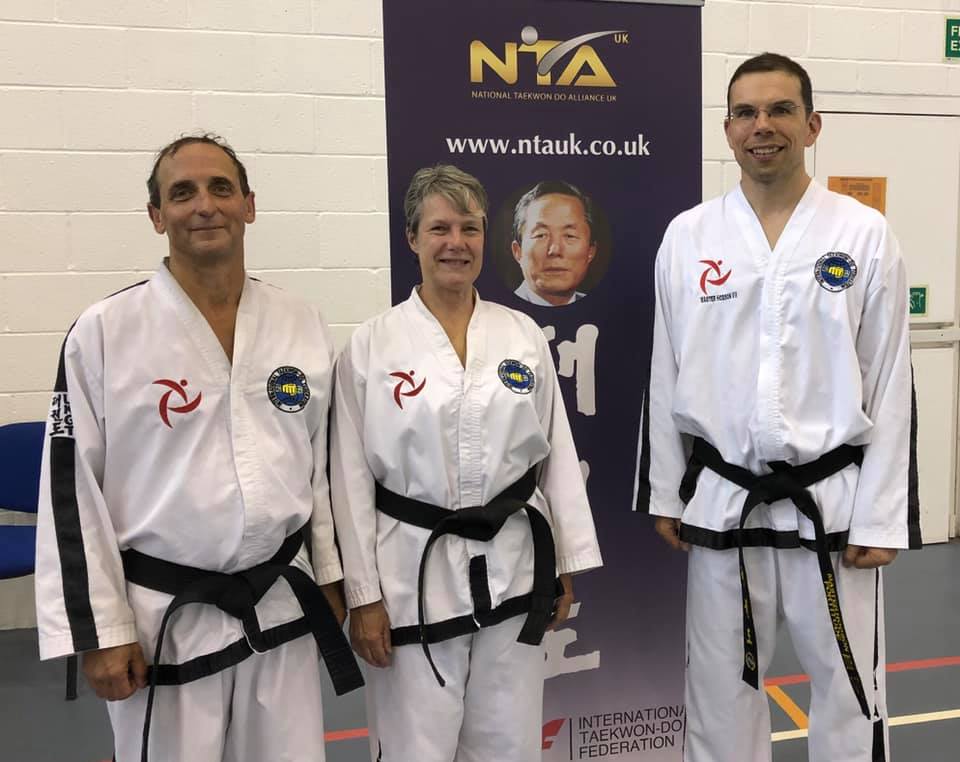THE TAEKWON-DO TENETS … IN A PANDEMIC
By Jane Anscombe – March 2021
We have all been affected in the COVID-19 pandemic of 2020-21 … schools and offices closed, no holidays, stuck at home unable to see friends and family. Sadly, many have also lost loved ones. We’ve suffered physically – too much food, not enough exercise – and many have suffered mentally too.
But Taekwon-Do has really helped. From those early pattern-focused Zoom classes, our training has evolved to include a wide variety of fundamentals and sparing drills. Not the same as being in class, but still improving our fitness and flexibility and encouraging to keep on training.
The mental benefits have arguably been even greater. At Fortitude, we are part of the Taekwon-Do family. We are not by ourselves. Even on zoom we see each other, support each other and are reassured that we are part of a community.
So where do the Tenets of Taekwon-Do come in? We learn them when we begin Taekwon-Do: Courtesy, Integrity, Perseverance, Self-Control and Indomitable Spirit. They represent the core set of beliefs or philosophy. In the wrong hands Taekwon-Do could be a lethal weapon, so the Tenets and mental training are just as important as the physical training: they prevent the student from misusing Taekwon-Do and promote a strong sense of justice, fortitude, humility and resolve.
In the pandemic, they have become even more relevant.
- Courtesy (Ye Ui)
Courtesy means being kind, having regard for the feelings of others, being respectful and well mannered. The Encyclopaedia also suggest that it means handling matters with fairness and sincerity and respecting others’ possessions.
Courtesy is the secret to harmonious living in a pandemic. Be kind and considerate. To our family even though we’re on top of each other all day, every day at present. And to our friends, who may be under much more mental stress than we realise. And to those who are working hard to help or serve us in difficult times: medics, shop assistants, delivery drivers, bus drivers and very many more.
- Integrity (Yom Chi)
At its simplest, Integrity means being able to tell right from wrong and to have the conscience, if wrong, to feel guilty. In other words, being honest and truthful. The Encyclopaedia suggests that Taekwon-Do examples where integrity is lacking include a student ‘fixing’ breaking materials before a demonstration to make themselves look better, or being ashamed to seek opinions from juniors.
An example of integrity during the pandemic is that we are doing lots of things on zoom instead of in person – Taekwon-Do lessons, school lessons, quizzes and so on. Our instructor/ teacher cannot always see what we are doing so it is easier to cheat. But we know that is wrong.
- Perseverance (In Nae)
Confucius said “one who is impatient in trivial matters can seldom achieve success in matters of great importance”. In other words, be patient and keep trying. We may feel we will never manage the perfect sidekick or flying kick, but the more we try the better we will get.
Lots of things have been harder to do in the pandemic and many people have found it much harder to motivate themselves, whether it be working from home or being on ‘furlough’ with nothing to do. But perseverance means not giving up, perhaps setting small daily targets towards bigger goals and keeping going towards them.
- Self-Control (Guk Gi)
Self-control is the ability to control oneself, in particular one’s emotions and desires, especially in difficult situations. People who lack self-control may frequently lose their tempers and cause upset or even physical harm to those around them. That might obviously be disastrous in the dojang, particularly when free-sparring. Our instructors teach us instead to be calm and to focus our energy on performing our techniques well and behaving appropriately towards our training partners and opponents.
Self-control is just as important outside the dojang, especially during the pandemic when we might not be able to do a lot of the things we want to do, or have to queue longer. Keep calm, keep yourself in check and think of others.
5 Indomitable Spirit (Baaekjul boolgool)
This is perhaps the tenet that puzzles us the most when we start training. It sounds like a rather quaint eastern terminology. Is it relevant to the way we live today?
In some respects, indominable spirit is a bit similar to perseverance, as in not giving up. But it’s more than that because it implies overcoming fears (be they minor insecurities or overwhelming odds). Our student Handbook suggests that with indomitable spirit we are unconquerable and unbeatable.
Take the Oxford scientists trying to develop a vaccine to treat Covid-19. Normally new vaccines take years of experimentation and trials, but the numbers of people in hospital were soaring and so too were the deaths. The odds must have seemed insurmountable. But hard work and calm determination paid off – a prime example of indomitable spirit.
Postscript – TENET
Have you ever noticed that ‘TENET’ is a palindrome? That means it is spelt the same forwards and backwards. You might think of it as a circle, and circles are very important in Korean and eastern philosophy. The two sides of Yin and Yang (Um and Yang in Korean) depict the two opposite elemental forces: light and dark, fire and water, hard and soft and so on. For example, the Taekwon-Do student begins as a white belt, knowing little about the martial arts, and moves through darkening belts until he becomes a black belt. At which point he arrives at a new beginning and starts a new journey. Everything within the Universe is always in constant motion but in harmony. It may not feel like it right now, in the middle of a worldwide pandemic, but if we always remember our Taekwon-Do tenets, and live by them, we will hopefully emerge calmer and stronger.



